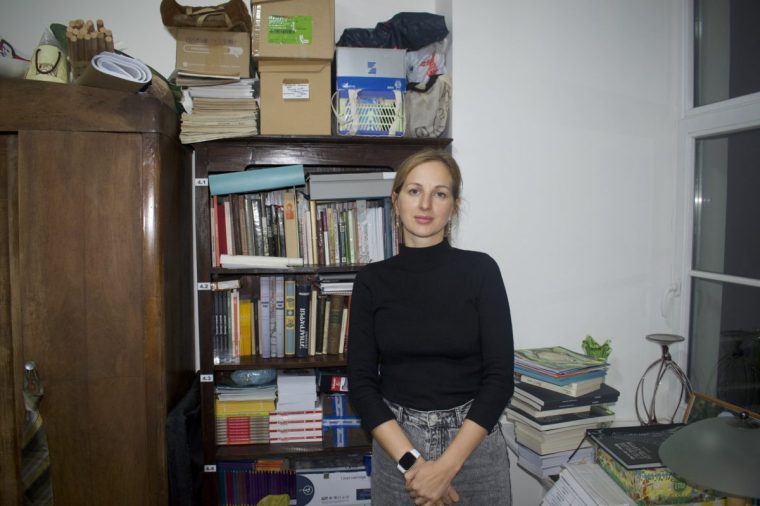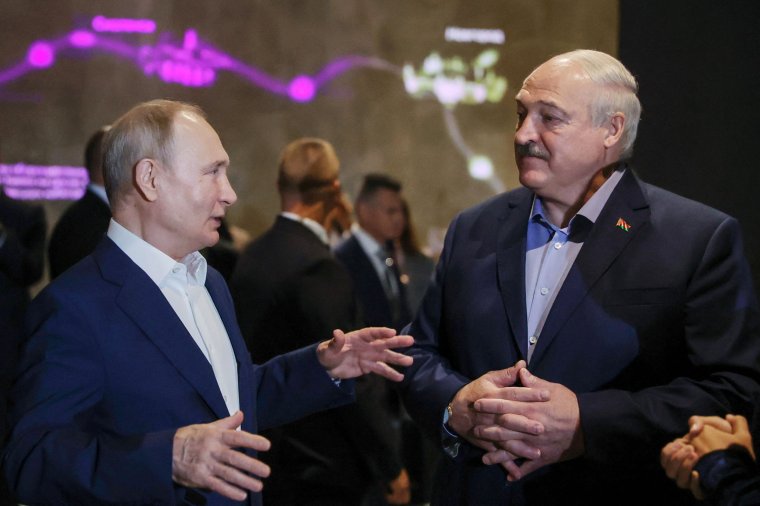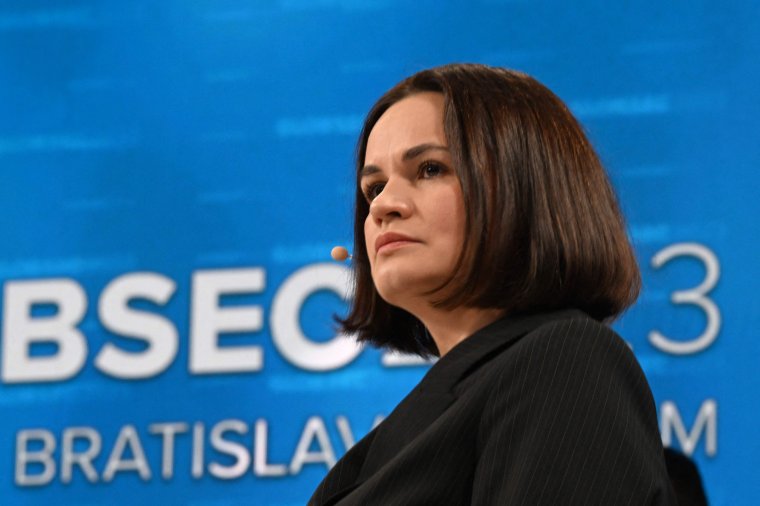VILNIUS – “She’s been scared to be left in a room alone ever since,” says Mara, pointing at the smashed windows while her eight-year-old daughter Sonia plays the Harry Potter theme tune on the piano.
Mara waits until music fills the room before she tells me about the attack on a Belarusian community centre in the Lithuanian capital of Vilnius where she teaches. “I don’t like to talk about this stuff when she can hear,” she says.
The attack left two windows of the centre smashed, with one gaping hole letting cold air in. Members of the centre believe it was the work of some kind of amateur air gun, but what exactly happened is unclear.
That same week in September, windows were smashed at the Belarusian Orthodox Church in Vilnius, while graffiti reading “No place for Belarusian parasites here!” was sprayed outside a Belarusian refugee centre. No one was hurt, but the attacks are ominous.
It’s not the first traumatic event Sonia has faced, even at such a young age. She had to flee Belarus with her parents three years ago after police came to search the family home, often a precursor to arrest in the authoritarian state for those who, like Sonia’s parents, have participated in political protest.

There are currently 1,298 political prisoners in the country according to Viasna, a human rights organisation based in the Belarusian capital, Minsk. Many were incarcerated following mass demonstrations against the outcome of the 2020 presidential election, widely accepted as rigged to secure the 30-year rule of President Alexander Lukashenko.
“She’s still scared of police officers too,” Mara says as her daughter keeps playing the piano. “She thinks they’re like the ones in Belarus.” Many of the Belarusian children Mara teaches in an arts and crafts class are the same, she says.
For Sviatlana Tsikhanouskaya, acknowledged by most international observers as the real winner of the 2020 election who now leads a government in exile from Lithuania, the cause behind the attacks on Belarusian centres was clear.
“We are certain that the Lukashenka regime is behind these efforts, continuously seeking to foster fear and hatred within Belarusian society and in neighbouring countries,” her office said in a statement after the attacks. “These acts are clearly meant to sow discord between Belarusians and Lithuanians.”
Lithuanian authorities have not confirmed who was responsible for the attacks. But many accept the possibility of KGB involvement. Still going under its Soviet name, the KGB is Belarus’ main security agency. Lithuania’s State Security Department said at the end of 2023 that the activity of Belarusian intelligence inside Lithuania had reached a “historically high” level inside Lithuania. Starting a “wave of anti-Belarusian sentiment” to sow disquiet within the country is one of the key aims of the KGB, according to Žygimantas Pavilionis, chair of the parliament’s European Affairs committee.

There are now over 60,000 Belarusians living in the small country of Lithuania, which borders Belarus’s north-west. Since the mass exodus of Belarusians into the safe haven of Lithuania to escape the increasing brutality towards dissidents following the 2020 protests, there have been several high-profile cases of KGB spies infiltrating and posing as Belarusian refugees, as well as cases of Lithuanians being recruited. At the end of September, Mantas Danielius, a Lithuanian lawyer, was sentenced to nine years in prison for passing information on Belarusian opposition leaders and activists to the regime.
Since 2020, more checks have since been introduced on the border and the number of crossing points reduced to prevent such cases.
While political repression is largely driving the increase in Belarusians in the country, the number of economic migrants is still far greater than political refugees. Belarusians have long been moving to their European neighbour to find better work opportunities. And while the political refugees cannot return home due to the threat of arrest, economic migrants often cross back and forward into Belarus to visit home. Despite clear warnings not to do so from their government, some Lithuanians even cross into Belarus to spend a day or buy goods at cheaper prices.
Reducing the frequency it is permitted to cross the border is something Dovile Sakaliene, Vice President of the Lithuanian Social Democrats, wants to see happen. And her party has just come out on top of parliamentary elections.
“Every time they go back to Belarus, it’s an additional risk. We don’t know what happened there. To put it very bluntly, if a person does not have any problems with the Belarusian KGB, well that person probably has problems with our intelligence services,” Sakaliene says.

Sakaliene describes the movement of economic migrants back and forward across the Belarusian border as a “ticking time bomb”. “We know that Belarusian security services monitor very closely who is moving over the border and are actively approaching them,” she says. “But we don’t know how many of those thousands of migrants that are moving across the border all the time have agreed to co-operate, and what sort of assignments they have agreed to perform for the Belarusian security services.”
Sectors such as HGV driving and transportation, which are a significant contributor to Lithuania’s GDP, rely heavily on Belarusian economic migrants’ labour. Sakaliene says she has had “painstakingly long” discussions with representatives of the sector ahead of moving into government, to address what she sees as a necessity for the sector to look for other solutions to staffing.
“We have to look for solutions where they don’t come from a country that is directly participating in the war which is threatening our existence as well,” says Sakaliene. “What I want to stop is importing ex-Soviet Union citizens into Lithuania… It’s not a good idea. These are the people who are most vulnerable when we talk about the activities from Russia.”

Belarus has been a key ally of Russia in its war in Ukraine, allowing its army to perform weeks-long military drills on its territory in the build-up to the full-scale invasion in February 2022. When the invasion began, Lukashenko allowed Putin to fire missiles from Belarusian territory, and Russian troops invaded Ukraine from Belarus’ border, which provided a quicker route to Kyiv than from the Russian side.
Reminding the rest of the world that Lukashenko does not represent democratic Belarusians, who vehemently oppose the war in Ukraine, has been a key task for Tskinouskaya in the two years since. “Of course Putin has a lot of influence on Lukashenka. Lukashenka is his puppet, they are in one chain, but we have to stop thinking about Belarus as an appendix of Russia, or part of Russia,” she says.
It is not just Belarusians in Lithuania who have to worry about the lingering KGB threat. There have also been infiltration cases in Poland, which has also welcomed thousands of its neighbours fleeing the regime.
In Warsaw I met Ales Zarembiuk, Chairperson of Belarus House, a foundation advocating for Belarusian human rights and democracy, who showed me a picture of a brown envelope which is now with Polish police. He called them after receiving it, as the return address came from a prison in Belarus with the name of a criminal serving a life sentence, likely for murder, whom he had never met. Crucially, it had no Polish stamps, leading him to conclude it had been hand delivered from across the border.
“It could be anything. Novichok. Who knows with these people,” Ales says. Police warned him not to open it, put it in a bomb bag and took it for investigation. Suspicion of novichok may seem an extreme reaction, but Ales’s past experience gives him reason to be wary. He previously welcomed Russian-Spanish journalist Pablo González as a guest to hear about the activities of Belarus House. Soon after, González was arrested by Polish authorities for spying for Russia. Though he doesn’t know what if anything may have been passed on, he is still clearly shaken by how close Russian intelligence were able to get.
Both Poland and Lithuania are praised by Tsikhanouskaya’s government in exile for giving Belarusian dissidents a refuge from the oppressive state, each welcoming tens of thousands. But they have a delicate balance to strike, protecting their own national security as European states on the front line with Russia.

“Here in Lithuania and Poland the general policy towards the Belarusian issue is clear – punish the regime, help Belarusians,” says Tsikhanouskaya. While she understands Lithuania’s security concerns, she says putting more restrictions on border crossings won’t stop KGB infiltration.
“These restrictions give advantage to Lukashenko, who will say Western neighbours don’t want you, they’re closing the borders, building walls between our countries. It proves his narrative that we only need Russia,” Tsikhanouskaya says.
“Believe me, the KGB are rather experienced. If they want to be in Lithuania or Poland they will come in different ways,” she tells me in her Vilnius office. “All these restrictions don’t influence the regime, they influence ordinary Belarusian people.”
The government in exile has also offered help to host countries in detecting people with potentially malign intentions, such as sharing databases of identities of Belarusians. “Several times people saw strange people in the shops or in the streets, or strange cars with the pro-regime flag and gave this information to local police to check these people. We are helping, we want to help Lithuanians with the KGB threat. But you can’t fire all truck drivers because they are Belarusian,” Tsikhanouskaya says.
Growing up in a post-Soviet dictatorship, Belarusian exiles themselves are well trained in remaining vigilant to who is listening. “We are so close to Belarus and so close to Russia, so I don’t feel 100 per cent protected but I have basic safety,” Tatiana* tells me at a rehearsal for the traditional Belarusian music group she is part of in Vilnius.
“But I still think about what I say to others, how my actions will be interpreted by others. It’s like a background thought, I cannot be fully relaxed. We learn to be very aware of our surroundings for our safety and remain so here.”
Is the issue still being sandwiched between Belarus and Russia, and will she ever be able to fully relax? “My friend also had this feeling in Poland and then she moved to Portugal and the feeling went away,” another band member chips in, before they commence the next song.


